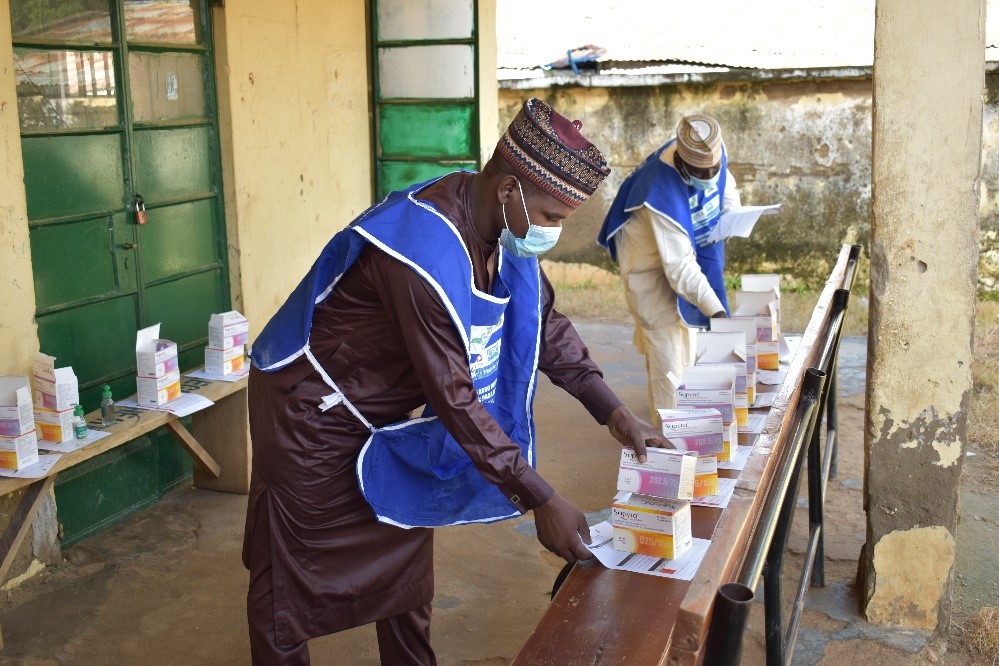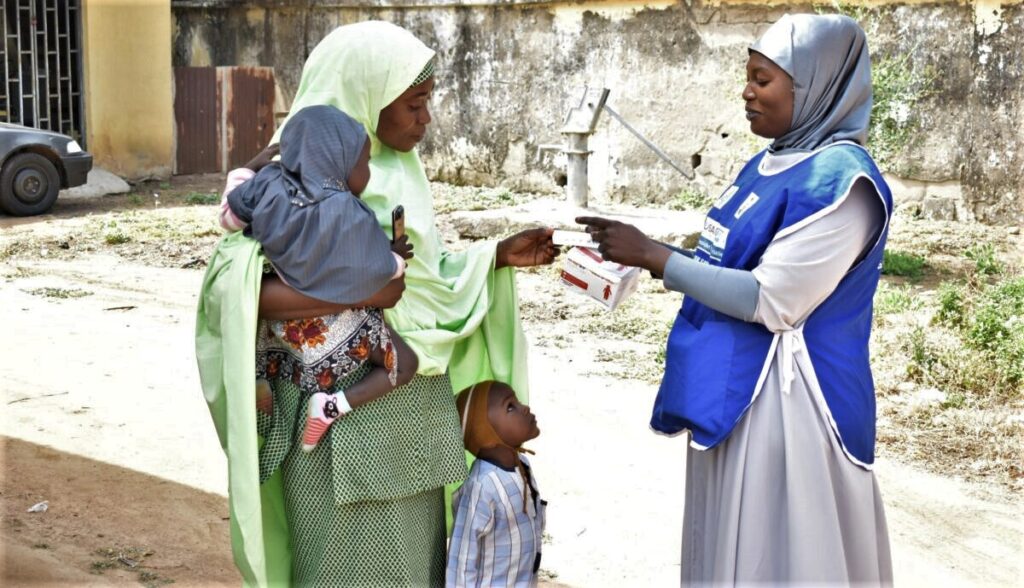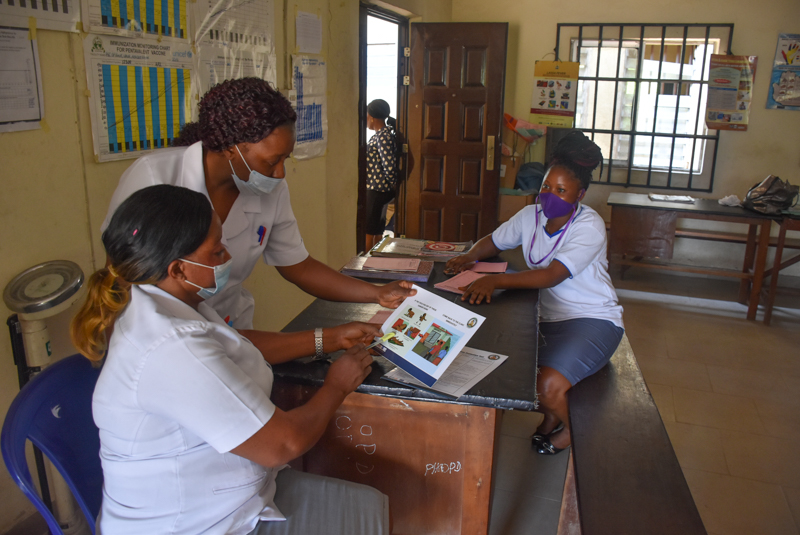US President’s Malaria Initiative for States (PMI-S) Project
US President’s Malaria Initiative for States (PMI-S) Project

Overview
The US President’s Malaria Initiative for States (PMI-S) project was USAID Nigeria’s and PMI’s flagship project to reduce malaria mortality and morbidity, especially among children under five and pregnant women. The project worked with the Government of Nigeria to improve the accessibility and quality of malaria prevention, diagnosis, and treatment services. PMI-S contributed to the National Malaria Elimination Program’s (NMEP) vision of achieving a malaria-free Nigeria by working with government entities to strengthen malaria policies and better coordinate malaria control activities. The five-year project was implemented in eight states to improve malaria case management, health care practices, and data management, quality, and usage.
The four main objectives of PMI-S were to:
- Improve malaria prevention and case management services in public and private health facilities
- Implement malaria control and treatment strategies to better protect pregnant women and children under the age of five
- Enhance monitoring and evaluation, including malaria surveillance and data quality
- Strengthen existing health systems and improve NMEP management
Achievements include:
- Malaria test positivity rates decreased over the last three years across all eight states where PMI-S is working. The most significant drop is in Ebonyi State, which had a test positivity rate of 82% in January 2020 and 54% in April 2023.
- Malaria case management, prevention, and data management strengthened in 151 health facilities in Oyo, Cross River, and Ebonyi States between October and December 2022. These states were recognized by the NMEP as among the best performing in malaria data quality management at the national 2022 biannual technical review meeting.
- PMI-S assisted state ministries of health in implementing seasonal malaria chemoprevention (SMC) activities across Nigeria, which included reaching over 1.3 million children in Zamfara State with the lifesaving medicine.
- PMI-S supported the successful roll-out of integrated community case management of malaria with community-oriented resource persons, who provide services to children across remote villages. Trained community health workers across all supported states provide counseling to pregnant women and older members of the community; treat children under five for malaria, pneumonia, and diarrhea; and detect danger signs that require referral to a health clinic.
Protecting Children during Peak Malaria Transmission Season
Many families across Nigeria can’t afford the time and resources it takes to seek health care services. For Saratu Babangida, a mother living in Zamfara State, she fears for the day her young children will become sick with malaria again and she must miss days on the farm to nurse them back to health. Because of ongoing conflicts that shut down markets, her family is already facing financial distress and may not be able to overcome another setback. Saratu’s call for help was answered when her children received preventive medicine during the annual SMC campaign. PMI-S trained local citizens to go directly to homes like Saratu’s and administer the medication to children. Now, Saratu can keep her children safe from malaria and continue to support her family.


Addressing Malaria during Pregnancy
Malaria is common among pregnant women in Nigeria—it increases the risk of maternal anemia, low birth weight, premature delivery, stillbirth, and death in infants. When first-time mother Mfon became pregnant, she worried about becoming ill with malaria, having known friends who lost their baby or gave birth prematurely. She visited a primary health center in Akwa Ibom State, where PMI-S works to maintain a steady supply of medicines to prevent malaria and trains health workers to counsel pregnant women on the importance of taking preventive medications during pregnancy and administering the right dosage. Following the advice she received, Mfon delivered a healthy baby without any complications from malaria.
Nurturing Health and Hope: A Nurse’s Dedication to Malaria Prevention and Maternal Care in Nigeria
Preventing malaria in pregnancy requires skills and coordinated care. In 2020, the PMI-S project trained Monica and other health workers in Plateau State on how to administer malaria preventive medication along with antenatal care.
Steering Nigeria’s Journey to Zero Malaria
The U.S. President’s Malaria Initiative for States (PMI-S) Bulletin highlights information about the significant achievements of the project during Fiscal Year 2023.
Join MSH at the American Society of Tropical Medicine & Hygiene (ASTMH) Annual Meeting 2023
Focusing on the theme From Evidence to Action, our malaria experts will be at the American Society of Tropical Medicine and Hygiene’s (ASTMH) Annual Meeting—#TropMed2023—in Chicago, IL, from October 18–22, to present our approaches to improving quality of care for malaria in Madagascar and Nigeria.

Uchenna Nwokenna
Country Director
Project Contact
Uchenna Nwokenna, is a public health professional with over 25 years of combined experience in clinical medicine, global public health, surveillance and control of infectious diseases, and supply chain management, pharmaco-epidemiology, drug safety, pharmacovigilance, and regulatory affairs. Nwokenna has extensive experience in public sector health program management, health systems strengthening, and epidemiology in Sub-Saharan Africa and Asia. Over the years, he has worked with various development partners, such as USAID, UNDP, UNOPS, CDC, UNAIDS, WHO, and The Global Fund on large-scale transformations related to organizational health and operational performance. Prior to joining MSH, he served as the Deputy Regional Program Director on the Regional Action through Data (RAD) project. Nwokenna holds M.Sc. degrees in Health Planning and Management and Environmental Microbiology from the University of Benin, Edo State, and another M.Sc. degree in Epidemiology from the University of London, UK.
Donors & Partners
Donors
The United States Agency for International Development (USAID)
U.S. President’s Malaria Initiative (PMI)
Partners
Banyan Global
ThinkWell
Nigerian Interfaith Action Association




